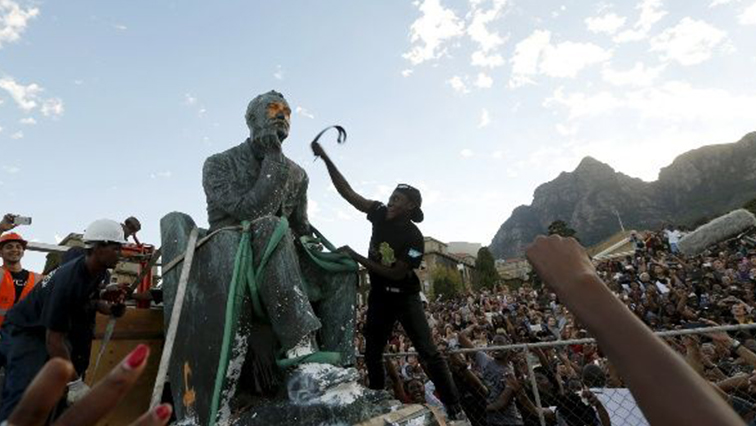The University of Cape Town’s #RhodesMustFall organisation has called for the removal of all statues that represent oppression, segregation and racism.
Organiser of #RhodesMustFall South Africa Chumani Maxhwele wants the government to also expedite the process to remove the statue of Cecil John Rhodes in the Company Gardens in Cape Town.
Maxhwele says, “With the idea of the removal of statues, its really to use the statues as a symbolic sign of the suffering of black people under the colonial and imperialist project that was led by the likes Cecill John Rhodes and other slave trade owners. And we know these statues are all over South Africa today as we speak.”
With the growing support for the Black Lives Matter (BLM) movement, which has sparked global protests, following the death of American George Floyd at the hands of a white policeman, the focus has now moved to targeting what is regarded as symbols of white supremacy.
In the US and Britain, BLM protesters pulled down the statues of slave traders and white supremacists, similar actions have since taken place in other countries as well.
The statue of a 17th century slave trader was pulled down in the English city of Bristol on Sunday, as anti-racism protests reignited a debate over monuments to those who exploited and sold Africans https://t.co/x7lKOwJ0tL pic.twitter.com/jSldDhQzkc
— Reuters (@Reuters) June 8, 2020
These incidents have reignited the debate about whether statues of controversial historic figures should be removed.
In 2015, South Africa witnessed the beginning of #RhodesMustFall (RMF) campaign, which began with protest action at the University of Cape Town and quickly spread to other campuses around the country, and then to Oxford University.
The campaign successfully led to the removal of the large statue of Cecil Rhodes from the University. However, the same cannot be said for Oxford University, where Rhodes’ statue still stands.
One of the students who was involved in the campaign Sizwe Mpofu-Walsh says,”This time is different, this time statues are being removed in the UK of slave owners, MPs have joined the call for Rhodes to fall, Oxford councillors have joined the call for Rhodes to fall in Oxford. 18 000 people have signed the petition for Rhodes to fall and so that small ripple has now turned, five years later, into a wave and I think that’s something that should make South Africans proud not only have we successfully contested the legacy of Rhodes in our country but we also managed to take the fight to the epicentre of the empire and contest the legacy there.”
During the height of the #RMF protesters also targeted the statue of Paul Kruger, in Church Square in Pretoria, while white supporters rallied around it.
Government went as far as surrounding the statue with barbed wire and then ringed it with a more permanent fence, to protect it.
Protesters converged on a college at Oxford University, chanting ‘take it down’ and ‘shame on you’ to demand the removal of a statue of 19th century British colonialist Cecil Rhodes https://t.co/gTSqFzle6f pic.twitter.com/RVXujKb1bv
— Reuters (@Reuters) June 9, 2020
Lead researcher from Benchmark Foundation and Social scientist, David Van Wyk says this flies in the face of much talked about reconciliation.
Van Wyk says,”When we talk about reconciliation we talk about victims and beneficiaries of the apartheid and colonial system and one asks what is it that the beneficiaries of apartheid and colonial system are actually giving up the least they can give up are statues and symbols of apartheid and oppression as it is there’s been no change in the economic realities of our country and the ownership structures and so on of our country.”
During the Economic Freedom Fighters (EFF) BLM solidarity protest on Monday, Floyd Shivambu lambasted South Africa for the use of what he called symbols of colonial invasion and oppression.
Shivambu says, “We know that Paul Kruger is not a hero of Africa we know that Jan Smarts is not a hero of Black people we know that Verwoerd is not our hero we know that Louis Botha is not our hero we know that all these colonial settlers are not our heroes but go in all parts of South Africa you will find symbols of colonial invasion and oppression of the callous murder of black people this is after 26yrs of the so called democracy we are surrounded by the system that oppressed all of us.”
However Afriforum CEO Kallie Kriel says mutual recognition and respect are key to a democratic society.
Kriel says, “The way to do that is on the basis of mutual recognition and respect that means you need to be able to respect the fact that even the heritage you don’t like is dear to someone else and you also need to respect the fact that there needs to be more statues to accommodate all if we are going to do that we will have true unity and diversity if you simply going to remove some statues that are dear to certain you are promoting polarisation and that is not in the interest of anybody.”
The debate continues as some believe that these statues mark history and honour heritage while many argue that they are racist symbols of oppression and slavery.
Calls for removal of colonial- era monuments






